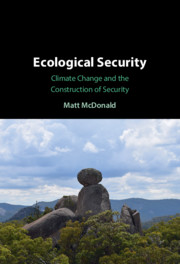21 results
Security: A Philosophical Investigation. By David Welch. New York: Cambridge University Press, 2022. 294p. $84.99 cloth, $29.99 paper.
-
- Journal:
- Perspectives on Politics / Volume 21 / Issue 4 / December 2023
- Published online by Cambridge University Press:
- 01 December 2023, pp. 1525-1526
- Print publication:
- December 2023
-
- Article
- Export citation
Spillover effects of financial incentives for providers onto non-targeted patients: daycase surgery in English hospitals
-
- Journal:
- Health Economics, Policy and Law / Volume 18 / Issue 3 / July 2023
- Published online by Cambridge University Press:
- 16 May 2023, pp. 289-304
-
- Article
-
- You have access
- Open access
- HTML
- Export citation
Acronyms and Abbreviations
-
- Book:
- Ecological Security
- Published online:
- 10 September 2021
- Print publication:
- 23 September 2021, pp ix-x
-
- Chapter
- Export citation
References
-
- Book:
- Ecological Security
- Published online:
- 10 September 2021
- Print publication:
- 23 September 2021, pp 199-231
-
- Chapter
- Export citation
Copyright page
-
- Book:
- Ecological Security
- Published online:
- 10 September 2021
- Print publication:
- 23 September 2021, pp iv-iv
-
- Chapter
- Export citation
Acknowledgements
-
- Book:
- Ecological Security
- Published online:
- 10 September 2021
- Print publication:
- 23 September 2021, pp vi-viii
-
- Chapter
- Export citation
5 - Towards Ecological Security?
-
- Book:
- Ecological Security
- Published online:
- 10 September 2021
- Print publication:
- 23 September 2021, pp 167-192
-
- Chapter
- Export citation
Introduction
-
- Book:
- Ecological Security
- Published online:
- 10 September 2021
- Print publication:
- 23 September 2021, pp 1-15
-
- Chapter
- Export citation
Conclusion
-
- Book:
- Ecological Security
- Published online:
- 10 September 2021
- Print publication:
- 23 September 2021, pp 193-198
-
- Chapter
- Export citation
Contents
-
- Book:
- Ecological Security
- Published online:
- 10 September 2021
- Print publication:
- 23 September 2021, pp v-v
-
- Chapter
- Export citation
1 - The Construction of Security
-
- Book:
- Ecological Security
- Published online:
- 10 September 2021
- Print publication:
- 23 September 2021, pp 16-43
-
- Chapter
- Export citation
4 - Means and Agents of Ecological Security
-
- Book:
- Ecological Security
- Published online:
- 10 September 2021
- Print publication:
- 23 September 2021, pp 123-166
-
- Chapter
- Export citation
Index
-
- Book:
- Ecological Security
- Published online:
- 10 September 2021
- Print publication:
- 23 September 2021, pp 232-240
-
- Chapter
- Export citation
2 - Climate Security Discourses
-
- Book:
- Ecological Security
- Published online:
- 10 September 2021
- Print publication:
- 23 September 2021, pp 44-93
-
- Chapter
- Export citation
3 - Ecological Security
-
- Book:
- Ecological Security
- Published online:
- 10 September 2021
- Print publication:
- 23 September 2021, pp 94-122
-
- Chapter
- Export citation

Ecological Security
- Climate Change and the Construction of Security
-
- Published online:
- 10 September 2021
- Print publication:
- 23 September 2021
The Morality of Security: A Theory of Just Securitization, Rita Floyd (Cambridge, U.K.: Cambridge University Press, 2019), 258 pp., cloth $99.99, eBook $80.
-
- Journal:
- Ethics & International Affairs / Volume 34 / Issue 2 / Summer 2020
- Published online by Cambridge University Press:
- 08 July 2020, pp. 255-257
-
- Article
- Export citation
Climate change and security: towards ecological security?
-
- Journal:
- International Theory / Volume 10 / Issue 2 / July 2018
- Published online by Cambridge University Press:
- 28 June 2018, pp. 153-180
-
- Article
- Export citation
Teaching for the Transition: the Canadian PGY-1 Neurosurgery ‘Rookie Camp’
-
- Journal:
- Canadian Journal of Neurological Sciences / Volume 42 / Issue 1 / January 2015
- Published online by Cambridge University Press:
- 09 January 2015, pp. 25-33
-
- Article
-
- You have access
- HTML
- Export citation
Contributors
-
-
- Book:
- Shakespeare Survey
- Published online:
- 05 December 2012
- Print publication:
- 08 November 2012, pp vi-vii
-
- Chapter
- Export citation



